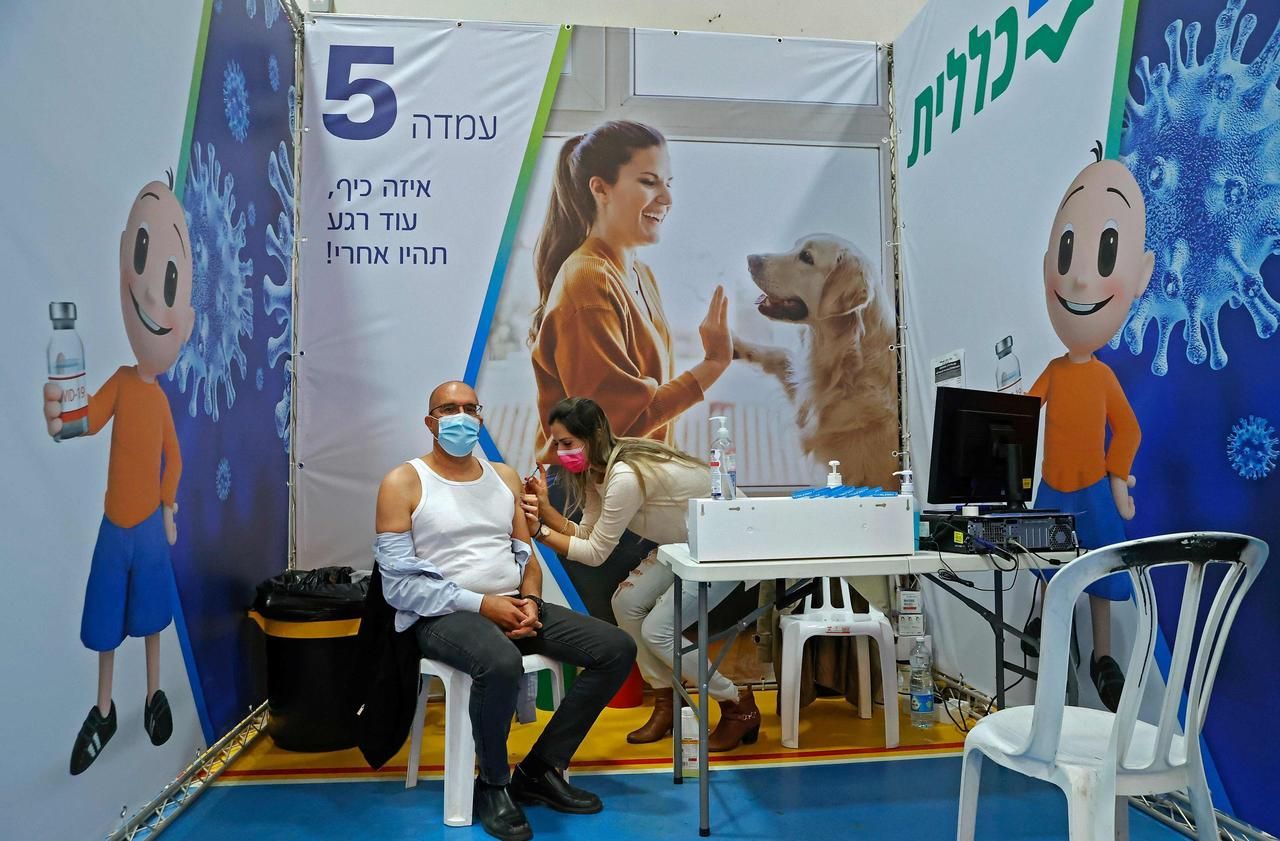The confinement in force for more than a month in Israel is gradually lifting from this Sunday, with still some restrictions: ban on gatherings, take-out only for restaurants ... Ben-Gurion international airport will remain closed until the 20th at least February, the authorities fearing the arrival of new mutated viruses that could thwart the effects of the mass vaccination launched at the end of December 2020.
In Israel, 3.5 million people have received the first dose, over 2 million have had both.
More than 70% of those over 60 have received two doses of the Pfizer vaccine.
In the fully vaccinated population, the rate of contamination has dropped dramatically.
The development of the English variant in young people nevertheless explains the fluctuation and the very slow decrease in new cases.
This vaccination campaign is closely scrutinized by Israeli experts who publish new information every day on the effectiveness, complications, and impact on mutated viruses.
Here are some of their results in detail.
Is the vaccine effective in reducing the number of patients?
The latest Israeli data released last Friday is very encouraging.
A study by the Maccabi health insurance fund, involving 420,000 people immunized with two doses, shows that 254 of them were subsequently infected with the virus, all with minor symptoms.
By comparison, in an equivalent unvaccinated group of similar age, during the same period, 7,000 people were infected, sometimes with serious forms.
"The vaccine is effective in 92% of cases," assures Professor Cyrille Cohen, member of the advisory council on the vaccine at the Ministry of Health, director of the immunotherapy laboratory (Bar Ilan University, Israel).
For the past 10 days, we have observed a 30% drop in hospitalized patients over the age of 60.
Ten days ago, we had 1,200 seriously ill patients in intensive care, currently there are 1,000.
Deaths are also declining: we had a peak in mortality on January 24 with 77 deaths per day, today we are at 45 per day.
"
Why are there still so many cases?
The new contaminations decrease very slowly.
Two days ago, 5,000 daily cases were recorded against 7,000 a week ago.
In question, the more contagious English variant, which currently represents 80% of infections in Israel.
"Unvaccinated or not fully vaccinated populations are those affected," replies Professor Michael Edelstein, professor of public health at the University of Bar Ilan, expert in vaccinology.
Because the vaccine is effective a priori against this strain.
As people over 60 are massively vaccinated, the average age of hospital patients has decreased.
Severe forms in young people infected with the English variant are now observed, which explains why the campaign has recently been opened to people over 16 years old.
Do injections cause side effects?
The antidote seems very well tolerated.
“A total of 0.3% of people vaccinated had side effects that led to a medical consultation, fever, pain in the arm, allergic reactions, notes Professor Cohen.
A few cases of transient facial paralysis have been observed, but it is difficult to know if the vaccine is involved.
Vaccination of people with severe allergies is decided on a case-by-case basis.
If necessary, it is done in the hospital better equipped to cope with allergic shock.
What about post-injection deaths?
The ministry is conducting an investigation, but in the case of very old people, it is difficult to demonstrate the possible link.
"In Israel, there are 150 deaths per day, the vast majority of the elderly," continues Cyrille Cohen.
We had a death two days after the vaccine in a 75-year-old person who had already had 6 heart attacks.
An 88-year-old person suffering from multiple pathologies also died after the vaccine.
There are no disturbing phenomena.
A lot of fake news is circulating about deaths after the vaccine.
"
Are we already somewhat protected after the first dose?
“After the first injection, the rate of infected people does not change in the first 14 days.
But after two weeks, the risk of infection decreases, ”replies Professor Michael Edelstein.
An Israeli study on 503,000 people confirms that between the 1st and the 12th day after a dose, the number of contaminations does not decrease.
However, from the 13th day, the risk drops by 50%.
Full protection is not observed until 10 days after the second injection.
Should you be vaccinated when you have already had the Covid?
For people already infected, vaccination is not a priority in Israel, except for caregivers.
However, a dose seems to be necessary to limit the risks.
“We did a study on 514 caregivers in Israel, some of whom had antibodies before vaccination,” reveals Michael Edelstein.
In these people who had the infection, a single dose of vaccine already triggered a significantly greater immune response than in others not previously infected.
"
Should it be recommended to pregnant women?
Recently in Israel (as in other countries), vaccination of pregnant women is recommended, in the fourth month of pregnancy.
"We made this decision after serious forms that occurred at the end of pregnancy," explains Professor Cohen.
It was already recommended to pregnant health professionals.
But it's true, this group has been excluded from clinical trials and we have very little data on the safety of the vaccine during pregnancy.
In Israel, more than 10,000 pregnant women have reportedly already been immunized.
No disturbing signals were observed.
When will life return to normal in Israel?
“No doubt in April we will see more clearly about the impact of vaccination on the epidemic and on mutant viruses.
You have to be patient, ”concludes Professor Cyrille Cohen.

